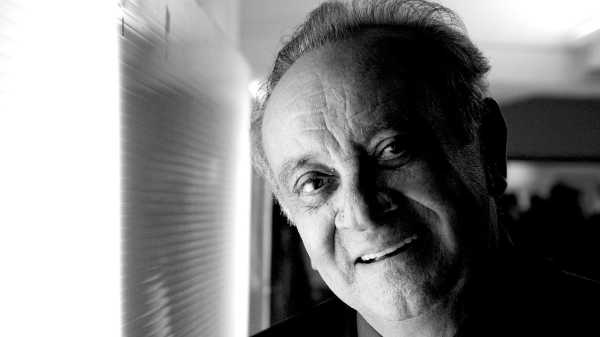
Not long ago, I ordered pizza for my teen-age son and a few of his buddies. It was early on a rainy fall evening, and I was walking my dog when the delivery person arrived at our home, in northeast Portland, Oregon. A Honda hatchback in need of a new muffler was pulling away as I approached the house. I grabbed the box of pizza from the porch, brought it inside, and, as I was dishing out the slices, I saw a note, written in Sharpie, on the inside lid of the box: “Twin Peaks changed my life!”
Sometimes, I’ll be at a restaurant, and, when I give the server my credit card, I can see them register my last name. They look at me curiously, look back down at the name, look at me again. They’re wide-eyed; sometimes they even look a tiny bit panicked. “Are you related to the composer?” they’ll ask. “Oh, yeah, he’s my uncle,” I’ll say. “My dad’s younger brother.” Maybe their hands are shaking a little when they hand my card back to me. Maybe they tell me how much they loved Angelo Badalamenti’s music; more often, it’s left unsaid.
Musicians have sent me tapes and CDs to give to Angelo; writers have sent me books. Once, a filmmaker sent me a VHS tape of his student film, poor guy. I never gave any of these things to my uncle—it wasn’t my place. I was his niece—a kid, not a colleague. There were always fans at the ad agencies where I spent much of my twenties and thirties. At an agency in Amsterdam, a producer would bring me hot chocolate and cookies, just because I was Angelo’s niece. I don’t know if people thought that I could do something for them. Perhaps just being in proximity to me, a direct lineage to Angelo, made our relationship seem important.
There have always been the fans who are obsessed with “Twin Peaks,” the 1990-91 television series, revived in 2017, for which Angelo composed and conducted the eerie, sometimes ecstatic music, alongside his dear friend and longtime collaborator David Lynch. But there are also core fans, the people who admire his very specific musical elixir, across decades and styles—jazz, synth-pop, classical orchestrations. These are the people who know that he used to go by Andy Badale in the early years of his career, when he composed songs for Nina Simone and Shirley Bassey, before re-becoming Angelo Badalamenti and working with the likes of Jane Campion, Jean-Pierre Jeunet, Marianne Faithfull, David Bowie, and the Pet Shop Boys. They know about his old Fender Rhodes with the broken-down keys. “Today, no music,” David Lynch said, on his daily weather report, after Angelo passed on December 11th, at the age of eighty-five.
Angelo was my father’s younger brother by seven years. There was a sister between them and a younger brother after them, and all of them are gone now—Angelo was the final sibling to pass. We are red-sauce Italian Americans who laid down roots in Bensonhurst and the wilds of North Jersey. My uncle’s accomplishments are a thread sewn throughout my father’s side of the family. During holidays with our extended clan, I spent many hours on my aunt and uncle’s couch next to his children, my cousins Danielle and Andre, stuffed to the gills on my grandmother’s meatballs, listening to film scores or watching my uncle on his baby-grand piano, my father playing the trumpet at his side. These were some of the most joyful moments in my life. I could say that my family is not refined, but I think that we are. I know that my uncle was beyond refined.
A few years ago, not long after my father died, I wanted to pay homage to my uncle and his life’s work, so I asked if I could interview him for a magazine, The Believer. I had regretted not sitting down with my dad and getting his life story—his early years growing up in Depression-era Brooklyn, the son of a Sicilian immigrant who peddled fruit from a street cart. I regretted not getting the firsthand story of how he and Angelo became musicians. My father was a jazz trumpet player, and I knew that, at times, he had to push Angelo to continue pursuing music, when all Angelo wanted to do was play stickball in the streets with his friends. “He was really my greatest influence and the most important thing that happened to me in my life,” Angelo said, about my dad, during one of our first interview sessions. “You have to say that, Frannie, make sure, make sure!”
Angelo was kind to me, generous with his time. We quickly developed a process. I would send him questions over e-mail, and he would recite his answers back to me, at home, into an old tape recorder. When my uncle felt that he had enough recorded material to answer my questions, we would set up a time to talk over the phone. He called these “phoners.” “Frannie, let’s have a phoner around six my time.” At the appointed hour, I’d call my aunt and uncle’s house phone, and he would pick up. “O.K., Frannie, you ready?” “I’m ready, Uncle Ang.” He would press Play on his end, and I would press Record on my end, both of our phones on speaker (mine an iPhone, his probably a home cordless). The resulting recordings were echoing, distorted, ghostly; twisted out of shape and out of time. They were, well, something out of a David Lynch film. I would hang up on those phoners and immediately call my older brother, Stephen, back in Jersey, to tell him about it, both of us laughing hysterically from one coastline to the other.
It was a wet spring, and I remember hiding out in our attic and transcribing material late into the night. My uncle told me that his love of music started around the age of seven, in my grandparents’ house in Brooklyn, where he would sit at their upright player piano and watch the keys as they played Irving Berlin’s “What’ll I Do,” a song that could bring him to tears. He told me that my paternal great-grandfather was a percussionist in Sicily and that my grandfather had a lovely singing voice; that, on my grandmother’s side, my great-grandfather and great-uncles would sit around after Sunday suppers and listen to Italian opera and weep. He told me that, when he was in high school, he began finding obscure poems at the library and putting them to his own music—piano and French horn. The idea of putting avant-garde poems to music foreshadows his prolific collaboration with David Lynch, who was sometimes my uncle’s lyricist—starting with “Mysteries of Love,” from “Blue Velvet” (1986).
My uncle initially went by the name Andy Badale, because it sounded less “ethnic.” (The story was that my grandfather had a cousin, Vincent, an accomplished trumpet player who also worked on film scores, who originally shortened our name.) It wasn’t until Angelo worked on “Blue Velvet” with the producer Dino De Laurentiis and the actress Isabella Rossellini—he was initially hired to coach Rossellini on how to sing the title song—that he started going by Angelo Badalamenti. Seeing those “beautiful names,” he said, gave him permission. By then, he was already in his late forties, and many of the preceding years had been lean and hard. He didn’t have an agent. Within a few years, though, he had won a Grammy, for his work on “Twin Peaks.”
I can see Angelo and David working all day in their pajamas, Angelo at his keyboard and David at his side, fuelled by endless cups of coffee; I can see my uncle’s chipped mug and old, tattered robe. After Angelo passed, a video circulated of him at his Fender Rhodes, narrating how he wrote the ominous-then-soaring “Laura’s Theme,” for “Twin Peaks,” with David sitting right next to him and talking through moods and pacing. “What do you see, David? Just talk to me,” my uncle recalled saying. They recorded the music on an old tape player; I wouldn’t be surprised if it was the one that he used to conduct our interviews or to record Isabella Rossellini rehearsing her rendition of “Blue Velvet.” It would have captured Angelo conjuring music from David’s passionate narration of Laura Palmer in a dark wood, just as he conjured music from obscure poems as a Brooklyn high schooler. “Angelo, that’s tearing my heart out,” David said, and they kept going until the work was done. ♦
Sourse: newyorker.com






